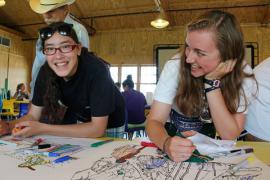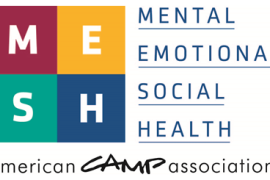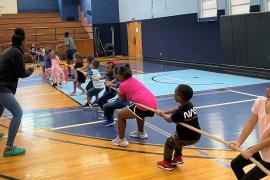Working closely and networking with other camp professionals is one of the best tools for growing our own camp programs. I am fortunate to have a dear friend, Audrey Monke, who is the owner/director of Gold Arrow Camp in California. Audrey is passionate about sharing her experiences and skills as a camp director beyond the scope of her campers, staff, and camp. Besides running a camp, Audrey’s goal is to be a resource on how to raise healthy and happy kids (and share the many benefits of sending kids to camp).
This month’s MESH (Mental, Emotional, and Social Health) post is a recent blog Audrey shared called “10 Ways to Teach Kids to Calm Down,” which will not only help our staff when working with kids, but is also relevant for helping our staff as well.
Here is an excerpt from Audrey’s post, “10 Ways to Teach Kids to Calm Down”:
Being able to resolve conflicts is one of the most important social skills our kids need in order to thrive in relationships and life. I’ve written a series of posts about different conflict resolution skills, including how to apologize well.
When kids (or adults) are really mad, words and reactions can be ugly. The inability to calm down, self-regulate, and manage anger can have lasting negative effects, the most important of which can be an adulthood that lacks meaningful, sustained relationships. And since the people and relationships in our lives are the most important predictor of happiness and well-being, this is a high price to pay for not learning to control anger.
For children, this can manifest itself in a number of ways, but the primary consequence of angry reactions is social rejection. In other words, anger in children is a deterrent to friendships, and lack of peer support at a young age often leads to an absence of fulfilling relationships later in life. That’s why teaching our kids to regulate their emotions and learn how to calm down when angry are extremely important life skills.
Take a look at adults who have trouble managing anger and the damage it can cause in their lives and the lives of those close to them. Angry people cause others to feel upset, intimidated, and unloved, which in turn leaves the angry person feeling isolated and often miserable. This reminds us, then, of how important it is to help our kids learn to calm down in the midst of difficult situations. Because no matter how hard we might try to pave our child’s path (also not a good idea), they will most definitely encounter people and situations that bring up negative emotions like anger, frustration, and sadness. And our kids need to learn how to process those emotions in a productive way.
For kids with low self-regulation, processing emotions productively can be a real challenge. Most are quick to anger, overreacting to small things like being on the losing end of a card game or misplacing a prized toy. Such children often perceive themselves as targets of other kids (even when they’re not). And even the kindest of kids can get annoyed at ones who have angry outbursts.
Continue reading Audrey's post here.
Pro Tip: Sign up for Audrey’s weekly newsletter at her website! As a camp director myself, her articles are relevant, educational, and very helpful for me in running my own program.
The views and opinions expressed by contributors are their own and do not necessarily reflect the views of the American Camp Association or ACA employees.




